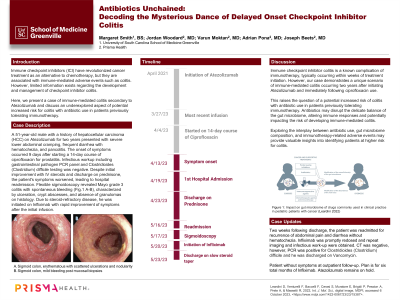Tuesday Poster Session
Category: Colon
P3110 - Antibiotics Unchained: Decoding the Mysterious Dance of Delayed Onset Checkpoint Inhibitor Colitis
Tuesday, October 24, 2023
10:30 AM - 4:00 PM PT
Location: Exhibit Hall

Has Audio

Jordan Woodard, MD
Prisma Health
Greenville, SC
Presenting Author(s)
Margaret Smith, BS1, Jordan Woodard, MD2, Varun Moktan, MD3, Adrian Pona, MD3, Joseph Beets, MD2
1University of South Carolina School of Medicine-Greenville, Travelers Rest, SC; 2Prisma Health, Greenville, SC; 3Prisma Health-Upstate, Greenville, SC
Introduction: Immune checkpoint inhibitors (ICI) have revolutionized cancer treatment as an alternative to chemotherapy, but they are associated with immune-mediated adverse events such as colitis. However, limited information exists regarding the development and management of checkpoint inhibitor colitis. Here, we present a case of immune-mediated colitis secondary to Atezolizumab and discuss an underexplored aspect of potential increased risk for colitis with antibiotic use in patients previously tolerating immunotherapy.
Case Description/Methods: A 51-year-old male with a history of hepatocellular carcinoma (HCC) on Atezolizumab for two years presented with severe lower abdominal cramping, frequent diarrhea with hematochezia, and pancolitis. The onset of symptoms occurred two weeks after completing a course of ciprofloxacin for prostatitis. Infectious workup including gastrointestinal pathogen PCR panel and Clostridioides (Clostridium) difficile testing was negative. Despite initial improvement with IV steroids and discharge on prednisone, the patient's symptoms worsened, leading to hospital readmission. Flexible sigmoidoscopy revealed Mayo grade 3 colitis with spontaneous bleeding (Fig.1 A-B), characterized by ulceration, crypt abscesses, and absence of granulomas on histology. Due to steroid-refractory disease, he was initiated on Infliximab with rapid improvement of symptoms after the initial infusion.
Discussion: Immune checkpoint inhibitor colitis is a known complication of immunotherapy, typically occurring within weeks of treatment initiation. However, our case demonstrates a unique scenario of immune-mediated colitis occurring two years after initiating Atezolizumab and immediately following ciprofloxacin use. This raises the question of a potential increased risk of colitis with antibiotic use in patients previously tolerating immunotherapy. Antibiotics may disrupt the delicate balance of the gut microbiome, altering immune responses and potentially impacting the risk of developing immune-mediated colitis. Exploring the interplay between antibiotic use, gut microbiome composition, and immunotherapy-related adverse events may provide valuable insights into identifying patients at higher risk for colitis.

Disclosures:
Margaret Smith, BS1, Jordan Woodard, MD2, Varun Moktan, MD3, Adrian Pona, MD3, Joseph Beets, MD2. P3110 - Antibiotics Unchained: Decoding the Mysterious Dance of Delayed Onset Checkpoint Inhibitor Colitis, ACG 2023 Annual Scientific Meeting Abstracts. Vancouver, BC, Canada: American College of Gastroenterology.
1University of South Carolina School of Medicine-Greenville, Travelers Rest, SC; 2Prisma Health, Greenville, SC; 3Prisma Health-Upstate, Greenville, SC
Introduction: Immune checkpoint inhibitors (ICI) have revolutionized cancer treatment as an alternative to chemotherapy, but they are associated with immune-mediated adverse events such as colitis. However, limited information exists regarding the development and management of checkpoint inhibitor colitis. Here, we present a case of immune-mediated colitis secondary to Atezolizumab and discuss an underexplored aspect of potential increased risk for colitis with antibiotic use in patients previously tolerating immunotherapy.
Case Description/Methods: A 51-year-old male with a history of hepatocellular carcinoma (HCC) on Atezolizumab for two years presented with severe lower abdominal cramping, frequent diarrhea with hematochezia, and pancolitis. The onset of symptoms occurred two weeks after completing a course of ciprofloxacin for prostatitis. Infectious workup including gastrointestinal pathogen PCR panel and Clostridioides (Clostridium) difficile testing was negative. Despite initial improvement with IV steroids and discharge on prednisone, the patient's symptoms worsened, leading to hospital readmission. Flexible sigmoidoscopy revealed Mayo grade 3 colitis with spontaneous bleeding (Fig.1 A-B), characterized by ulceration, crypt abscesses, and absence of granulomas on histology. Due to steroid-refractory disease, he was initiated on Infliximab with rapid improvement of symptoms after the initial infusion.
Discussion: Immune checkpoint inhibitor colitis is a known complication of immunotherapy, typically occurring within weeks of treatment initiation. However, our case demonstrates a unique scenario of immune-mediated colitis occurring two years after initiating Atezolizumab and immediately following ciprofloxacin use. This raises the question of a potential increased risk of colitis with antibiotic use in patients previously tolerating immunotherapy. Antibiotics may disrupt the delicate balance of the gut microbiome, altering immune responses and potentially impacting the risk of developing immune-mediated colitis. Exploring the interplay between antibiotic use, gut microbiome composition, and immunotherapy-related adverse events may provide valuable insights into identifying patients at higher risk for colitis.

Figure: A. Sigmoid colon, erythematous with scattered ulcerations and subtle nodularity
B. Sigmoid colon, mild bleeding post mucosal biopsies
B. Sigmoid colon, mild bleeding post mucosal biopsies
Disclosures:
Margaret Smith indicated no relevant financial relationships.
Jordan Woodard indicated no relevant financial relationships.
Varun Moktan indicated no relevant financial relationships.
Adrian Pona indicated no relevant financial relationships.
Joseph Beets indicated no relevant financial relationships.
Margaret Smith, BS1, Jordan Woodard, MD2, Varun Moktan, MD3, Adrian Pona, MD3, Joseph Beets, MD2. P3110 - Antibiotics Unchained: Decoding the Mysterious Dance of Delayed Onset Checkpoint Inhibitor Colitis, ACG 2023 Annual Scientific Meeting Abstracts. Vancouver, BC, Canada: American College of Gastroenterology.

